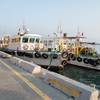The Ministry of Shipping, India has sanctioned Rs. 30 Crore ($4.37 mln) for capacity building and providing safety training of 20,000 workers engaged in ship recycling activities at Alang-Sosiya recycling yard in Gujarat.
In addition, Rs. 13.77 Crore has also been sanctioned for skill training in 27 coastal districts in convergence with Deen Dayal Upadhyaya Grameen Kaushalya Yojana (DDU-GKY).
In addition to this, to support the development of fishermen community, the Ministry is funding select fishing harbor projects under Sagarmala in convergence with Department of Animal Husbandry Dairying & Fisheries (DADF).
In this regard, Rs. 13 Crore has been sanctioned for the modernization of the existing fishing harbor at Sassoon Dock, in Mumbai. In-principle approval has also been obtained for upgrading the 9 fishing harbors across Maharashtra, Karnataka, Kerala, Tamil Nadu and Gujarat costing over Rs. 50 Crore. The Ministry will also be supporting the development of deep sea fishing vessels and fish processing centres in convergence with DADF.
The above action has been taken in consonance with the Ministry’s objective for sustainable development of the coastal areas as part of the Sagarmala programme. A well-defined action plan to ensure holistic and sustainable development has been drawn as part of its National Perspective Plan. The coastal communities are recognized as critical stakeholders in the Sagarmala’s “port led development” agenda.
Modernization of ports, port-led industrialization and enhancement of port-connectivity will be the key drivers for socio-economic development of coastal areas under Sagarmala. More than 200 projects have been identified for implementation in the coastal regions which are expected to generate employment opportunity of approximately 1 crore, including 40 lakh direct jobs by 2025.
The programme, through its skill development initiatives, will broaden the livelihood options especially for coastal communities and adequately equip them with enhanced skill set to increase their employability and standard of living.
In this regard, the Ministry of Shipping is undertaking a skill gap analysis in 23 coastal districts in phase one to understand the demand-supply gap in these districts with special emphasis on skill requirements in the ports & maritime Sector.
To provide skilling for port & port user community, the Ministry will organize cutting-edge skill training in ports & maritime sector and is evaluating the proposal for setting up of Multi-Skill Development Centres linked to Major Ports.
The Ministry of Shipping is also promoting coastal tourism for providing more livelihood opportunities for coastal communities by developing lighthouses as tourist destinations and promoting cruise tourism in India.
The Ministry will provide funding grants, under Sagarmala, for capacity building, infrastructure, and social development projects related to coastal communities. Guidelines have been prepared for the same.
Globally, ports have proved to be the engines of sustainable growth for coastal communities providing direct and indirect benefits to the coastal region. The port of Seattle is one such success story.
The marine cargo activity of the port combined with fishing, cruise operations, recreational activities, and port-real estate etc has created more than 2 lakh direct and 7 lakh indirect jobs and mobilized upto 10 USD Billion of income. In addition to this 1,76,000 jobs have been created related to port cargo movement via terminals.
In 2013, the movement of cargo through the port accounted for 11.6 percent of the Washington state. As per the OECD report, one tone of port throughput is associated with USD 100 of economic value addition and an increase of 1 mn tones of port throughput is associated with an increase in short-term employment of 300 jobs in port region.
Sustainable inclusive growth is an integral part of Sagarmala, with emphasis on economic development, nurturing communities as well as preserving the ecological balance. With about 18 percent of India’s population living in the 72 coastal districts, comprising 12 percent of India’s mainland, the 7500 km long coastline of India has the potential to become an engine of growth for the whole country.
However, the pace of socio-economic development among the maritime states has not been uniform in terms of per capita income, poverty reduction and infrastructure development. Therefore, there is a need for holistic and sustainable development of coastal communities, especially fisherman population.
Under Sagarmala, modernization of existing ports, enhancement of connectivity of coastal areas, port-led industrialization and development of infrastructure for fisheries will be the key drivers for socio-economic development of coastal community. These initiatives are expected to generate job opportunity of about 60 Lakh direct and 40 lakh direct jobs.
Sagarmala is a holistic development plan for the overall growth of the economy. Along with generation of job opportunities, the programme is set to be a game changer in saving logistic cost upto Rs. 35,000 - 40,000 crore per annum, enhancing modal mix for cargo movement.














